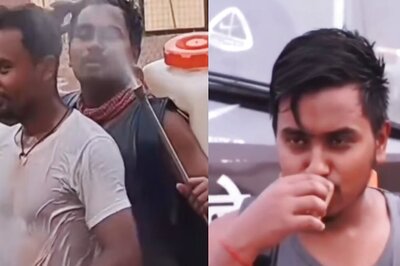
views
New Delhi: The poor villager 'Vishwam' of the film 'Nishant' is once again ready to set the silver screen on fire with another meaningful performance in his September release 'The Blueberry Hunt'. Naseeruddin Shah is playing the role of a recluse who grows marijuana for a living and is completely disillusioned with the social system.
Directed by Anup Kurian, 'The Blueberry Hunt', is also being made into a graphic novel, slated to release with the film. With 'The Blueberry Hunt' Shah, 61, has again shown his partiality towards young directors who have a new story to tell.
Take Michael and The Dirty Picture for example. The Dirty Picture is based on the life of south India's famous sex siren Silk Smitha, where Shah is donning a role modeled on the lines of superstar Rajinikanth. Produced by Balaji, The Dirty Picture has Milan Lutharia as the director and Tusshar Kapoor as the male lead.
Michael is a racy thriller involving a Catholic family from Kolkata and their economic problems. Assistant director of Gulaal, Ribhu Dasgupta is directing this film. The director of Gulaal, Anurag Kashyap is directing Shah in his soon to be released film That Girl in Yellow Boots. The film traces a young girl’s search for her father, whom she has not met in several years.
The search for her roots in ruthless Mumbai confronts her with a shocking truth. Shah is playing a pivotal role in the film. Bengali director Rituparno Ghosh is teaming up with Shah for the first time in his film Sunglass.
Shoonya and Mad Dad are also on the list of future releases with Shah in central roles. Well known southern actor Sneha is making her debut into Hindi film industry with Mad Dad. Positioned in 1980, Mad Dad belongs to an off beat genre.
Shah's romance with the small budget film
Shah's love for small budget films and lesser known but talented directors goes back to late 70s, when he had conceptualized his theater group 'Motley Productions' with Benjamin Gilani and Tom Alter, in order to give chance to new playwrights and directors.
Always in-hunt for a good plot, he never let pass an opportunity to do meaningful cinema even when he was unemployed for a fairly long period after 'Nishant'. Known for his candid opinions, he once had said that probably filmmakers believed him as a real farmer who was accidentally put into the role of Vishwam and tha's why they never approached him.
With absolute command over diction, Shah excelled in offbeat films. Sometimes, his mannerisms were so perfect that the directors had to advice him to dilute his diction. He remained an actor exclusively made for parallel films till Hum Paanch in 1980. However, he continued to patronize good scripts and film enthusiasts with no industry experience, without caring much about the payment he received in return.
He was still looking for significant roles, while his fellow parallel film actors graduated to commercial cinema for evident reasons. But when Shah wanted to jump onto the bandwagon, rivals blamed him for the death of the parallel cinema movement. In reality, he along with Om Puri, Shabana Azmi and a handful of others, were the only people concerned about the low budget films with strong social content.
Shah recognized his potential and penchant for comedy through one of the low budget films and an industry outsider Ketan Mehta. Mehta handled Shah with utmost care and brought him closer to good films with smaller budget and wider audience band. Doing several films together, Mehta groomed Shah as someone who can undergo transition from character roles to glamorous character roles in a swift manner, displaying the same authentic dialect with proper baritone.
His sacrifice of money, earlier in his career, had made him work extra hard on his acting skills, but that paid eventually, when he was accepted without any prejudice in commercial or rather popular cinema, without much ado. Hero Hiralal, Vishwatana, Tridev and finally Mohra stamped his authority over the roles that required flaunting complex psychological issues with simple gestures. He became an offbeat actor who could fetch mainstream audiences too.
A new phase of Naseer's acting began with Bombay Boys in 1996. It was not an easy thing to portray unusual roles in an era of Yash Raj and look-alikes' domination. The popular thought that three flops in a row and an actor is out forever did not daunt the veteran who refused to change his style and went on to deliver several commercially successful films such as Sarfarosh, Monsoon Wedding, Maqbool, Main Hoon Na, Iqbal, Khuda Ke Liye, A Wednesday, and Ishqiya. Mostly all of the films were with first time directors. Yun Hota To Kya Hota, his directorial debut, was just an extension of his graceful love for potential talents without typical Bollywood characteristics.
His recent films such as Saat Khoon Maaf and Zindagi Na Milegi Dobara reestablished his penchant for new talent. The same mindset seems to be operating in his upcoming films also, where he is taking commands from the young but promising directors.


















Comments
0 comment